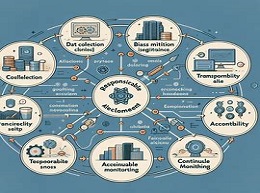Blockchain and Cryptocurrencies: Beyond Bitcoin

Beyond Bitcoin - The Evolution of Blockchain
While Bitcoin pioneered the concept of blockchain technology, its applications extend far beyond digital currencies. Blockchain has evolved into a versatile platform that powers a multitude of cryptocurrencies and innovative solutions across industries. In this article, we explore the diverse landscape of blockchain and cryptocurrencies, highlighting their transformative potential and real-world applications.
Understanding Blockchain Technology
What is Blockchain?
Blockchain is a decentralized, distributed ledger technology that records transactions across a network of computers in a secure and immutable manner. Each block in the blockchain contains a cryptographic hash of the previous block, creating a chain of interconnected blocks, hence the name "blockchain."
Example: Ethereum
Ethereum is a blockchain platform that enables developers to build decentralized applications (dApps) and smart contracts. Unlike Bitcoin, which primarily serves as a digital currency, Ethereum's blockchain supports programmable transactions, enabling a wide range of applications beyond simple peer-to-peer transactions.
Diverse Cryptocurrencies and Tokens
1. Ethereum (ETH):
Ethereum introduced the concept of smart contracts, self-executing contracts with predefined conditions written in code. These smart contracts enable a wide range of applications, including decentralized finance (DeFi), decentralized autonomous organizations (DAOs), and non-fungible tokens (NFTs).
2. Ripple (XRP):
Ripple aims to facilitate real-time cross-border payments and remittances by providing a fast, low-cost alternative to traditional banking systems. Ripple's network, RippleNet, enables financial institutions to settle transactions quickly and efficiently using its native cryptocurrency, XRP.
3. Chainlink (LINK):
Chainlink is a decentralized oracle network that connects smart contracts with real-world data. By providing reliable and tamper-proof data feeds, Chainlink enables smart contracts to interact with external data sources, enabling applications such as decentralized finance, supply chain management, and insurance.
Applications Across Industries
1. Finance and Banking:
Blockchain technology is revolutionizing the finance industry by enabling faster, cheaper, and more transparent transactions. Decentralized finance (DeFi) platforms leverage blockchain to offer financial services such as lending, borrowing, and trading without intermediaries.
2. Supply Chain Management:
Blockchain enhances supply chain transparency and traceability by recording every transaction and movement of goods on an immutable ledger. Companies like IBM and Walmart use blockchain to track and authenticate products throughout the supply chain, reducing fraud and ensuring product integrity.
3. Healthcare:
In healthcare, blockchain technology secures patient data, streamlines medical record management, and facilitates interoperability between healthcare providers. Platforms like MedRec and Medicalchain use blockchain to empower patients with control over their medical data and enable secure sharing with healthcare professionals.
Challenges and Considerations
Scalability:
Blockchain scalability remains a challenge, with limitations on transaction throughput and network congestion. Solutions like layer-2 scaling solutions and sharding aim to address scalability issues and improve blockchain performance.
Regulation:
Regulatory uncertainty and compliance requirements pose challenges for blockchain and cryptocurrency adoption. Governments and regulatory bodies are grappling with how to regulate cryptocurrencies while balancing innovation and consumer protection.
Security:
Despite blockchain's inherent security features, vulnerabilities such as smart contract bugs and 51% attacks pose risks to blockchain networks. Continuous security audits and robust governance mechanisms are essential for mitigating security threats.
Future Outlook
Interoperability:
Interoperability between different blockchain networks is crucial for enabling seamless data exchange and interoperable applications across ecosystems. Projects like Polkadot and Cosmos aim to facilitate interoperability between disparate blockchain platforms.
Adoption:
Increased adoption of blockchain and cryptocurrencies across industries is expected to drive mainstream acceptance and integration into everyday life. Innovations in blockchain technology and user-friendly interfaces will play a key role in accelerating adoption.
The Future of Blockchain and Cryptocurrencies
In conclusion, blockchain technology and cryptocurrencies are reshaping industries, driving innovation, and empowering individuals with greater control over their finances, data, and digital assets. Beyond Bitcoin, blockchain's potential to disrupt traditional systems and revolutionize various sectors is vast and far-reaching. As we continue to explore the possibilities of blockchain technology and embrace its transformative power, collaboration, innovation, and responsible stewardship will be key in shaping a decentralized and equitable future.














